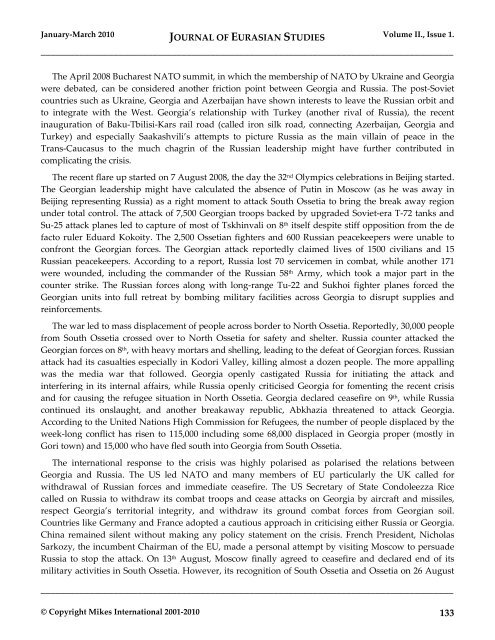EurasianStudies_0110..
EurasianStudies_0110..
EurasianStudies_0110..
You also want an ePaper? Increase the reach of your titles
YUMPU automatically turns print PDFs into web optimized ePapers that Google loves.
January-March 2010 JOURNAL OF EURASIAN STUDIES Volume II., Issue 1.<br />
_____________________________________________________________________________________<br />
The April 2008 Bucharest NATO summit, in which the membership of NATO by Ukraine and Georgia<br />
were debated, can be considered another friction point between Georgia and Russia. The post-Soviet<br />
countries such as Ukraine, Georgia and Azerbaijan have shown interests to leave the Russian orbit and<br />
to integrate with the West. Georgia’s relationship with Turkey (another rival of Russia), the recent<br />
inauguration of Baku-Tbilisi-Kars rail road (called iron silk road, connecting Azerbaijan, Georgia and<br />
Turkey) and especially Saakashvili’s attempts to picture Russia as the main villain of peace in the<br />
Trans-Caucasus to the much chagrin of the Russian leadership might have further contributed in<br />
complicating the crisis.<br />
The recent flare up started on 7 August 2008, the day the 32 nd Olympics celebrations in Beijing started.<br />
The Georgian leadership might have calculated the absence of Putin in Moscow (as he was away in<br />
Beijing representing Russia) as a right moment to attack South Ossetia to bring the break away region<br />
under total control. The attack of 7,500 Georgian troops backed by upgraded Soviet-era T-72 tanks and<br />
Su-25 attack planes led to capture of most of Tskhinvali on 8 th itself despite stiff opposition from the de<br />
facto ruler Eduard Kokoity. The 2,500 Ossetian fighters and 600 Russian peacekeepers were unable to<br />
confront the Georgian forces. The Georgian attack reportedly claimed lives of 1500 civilians and 15<br />
Russian peacekeepers. According to a report, Russia lost 70 servicemen in combat, while another 171<br />
were wounded, including the commander of the Russian 58 th Army, which took a major part in the<br />
counter strike. The Russian forces along with long-range Tu-22 and Sukhoi fighter planes forced the<br />
Georgian units into full retreat by bombing military facilities across Georgia to disrupt supplies and<br />
reinforcements.<br />
The war led to mass displacement of people across border to North Ossetia. Reportedly, 30,000 people<br />
from South Ossetia crossed over to North Ossetia for safety and shelter. Russia counter attacked the<br />
Georgian forces on 8 th , with heavy mortars and shelling, leading to the defeat of Georgian forces. Russian<br />
attack had its casualties especially in Kodori Valley, killing almost a dozen people. The more appalling<br />
was the media war that followed. Georgia openly castigated Russia for initiating the attack and<br />
interfering in its internal affairs, while Russia openly criticised Georgia for fomenting the recent crisis<br />
and for causing the refugee situation in North Ossetia. Georgia declared ceasefire on 9 th , while Russia<br />
continued its onslaught, and another breakaway republic, Abkhazia threatened to attack Georgia.<br />
According to the United Nations High Commission for Refugees, the number of people displaced by the<br />
week-long conflict has risen to 115,000 including some 68,000 displaced in Georgia proper (mostly in<br />
Gori town) and 15,000 who have fled south into Georgia from South Ossetia.<br />
The international response to the crisis was highly polarised as polarised the relations between<br />
Georgia and Russia. The US led NATO and many members of EU particularly the UK called for<br />
withdrawal of Russian forces and immediate ceasefire. The US Secretary of State Condoleezza Rice<br />
called on Russia to withdraw its combat troops and cease attacks on Georgia by aircraft and missiles,<br />
respect Georgia’s territorial integrity, and withdraw its ground combat forces from Georgian soil.<br />
Countries like Germany and France adopted a cautious approach in criticising either Russia or Georgia.<br />
China remained silent without making any policy statement on the crisis. French President, Nicholas<br />
Sarkozy, the incumbent Chairman of the EU, made a personal attempt by visiting Moscow to persuade<br />
Russia to stop the attack. On 13 th August, Moscow finally agreed to ceasefire and declared end of its<br />
military activities in South Ossetia. However, its recognition of South Ossetia and Ossetia on 26 August<br />
_____________________________________________________________________________________<br />
© Copyright Mikes International 2001-2010 133

















